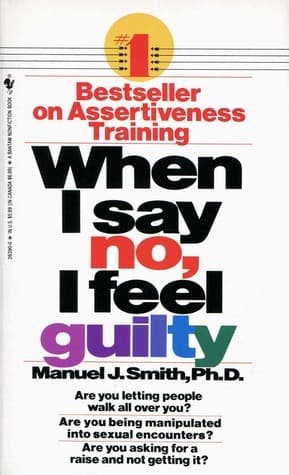
Book Review Summary: When I Say No, I Feel Guilty: How to Cope - Using the Skills of Systematic Assertive Therapy
Introduction
"When I Say No, I Feel Guilty: How to Cope - Using the Skills of Systematic Assertive Therapy" by Manuel J. Smith is a book that offers practical techniques for assertiveness and coping with various situations. It has gained popularity among readers who struggle with asserting themselves, and it has been praised for its helpful methods in dealing with criticism, manipulation, and other relationship issues. In this article, we will explore the book's content, analyze common opinions, and provide reasons for both recommending and not recommending it.
About Manuel J. Smith
Manuel J. Smith, the author of "When I Say No, I Feel Guilty," is a renowned psychotherapist and author. He has dedicated his career to helping individuals overcome their fears and insecurities, particularly in the area of assertiveness. With his expertise in systematic assertive therapy, Smith provides practical guidance and valuable insights in this book.
Analysis of Views
-
Understanding Assertiveness: Readers appreciate the book's focus on assertiveness and its importance in various aspects of life. They find the explanations of assertive human rights and the concept of asserting oneself without feeling guilty helpful in understanding their own boundaries.
-
Practical Techniques: Many readers find the practical techniques presented in the book, such as "fogging" and negative inquiry, to be particularly useful. These techniques help individuals unlearn knee-jerk reactions and learn to listen calmly rather than react defensively. They also appreciate the inclusion of sample dialogues to illustrate how to apply these techniques in real-life situations.
-
Transcripts of Assertive Dialogues: Some readers find the inclusion of transcripts of assertive dialogues helpful in drilling the concepts of assertiveness into their brains. While it may be laborious to get through at times, they believe that these examples are valuable for understanding how to assert oneself effectively.
-
Revolutionary Approach: Readers appreciate the revolutionary approach that Smith takes in this book. He challenges common beliefs and societal norms that hinder individuals from asserting themselves, emphasizing the importance of asserting one's rights without feeling guilty.
-
Real-Life Examples: The book contains numerous real-life examples that readers find engaging and entertaining. These examples make the concepts more relatable and applicable to various situations, making it a valuable resource for personal and professional interactions.
Reasons for Recommendation
-
Practical Techniques: The practical techniques presented in the book are highly recommended by readers who find them effective in dealing with criticism, manipulation, and other relationship issues. They appreciate the step-by-step guidance and the inclusion of sample dialogues to demonstrate how to apply these techniques in real-life situations.
-
Real-Life Examples: The inclusion of real-life examples makes this book a valuable resource for readers who want to improve their assertiveness skills in various contexts. The relatable scenarios help readers understand how to apply the concepts in their own lives, making it a recommended read for those seeking practical solutions.
-
Revolutionary Approach: Readers appreciate the revolutionary approach taken by Smith in this book. By challenging common beliefs and societal norms that hinder individuals from asserting themselves, he provides a fresh perspective on assertiveness training. This approach resonates with readers who are looking for innovative ways to improve their communication skills and assert their rights without feeling guilty.
Reasons for Not Recommendation
-
Outdated Scenarios: Some readers find the book's scenarios outdated and unrealistic, particularly in terms of gender roles and societal norms. They feel that these examples may not be applicable or relatable to contemporary readers, which could hinder their ability to fully engage with the content.
-
Manipulative Techniques: A few readers express concerns about certain techniques presented in the book, such as "fogging" and negative inquiry, feeling manipulative or unethical. They argue that these techniques may not be effective or appropriate in all situations, particularly when dealing with manipulative individuals or situations.
Conclusion
"When I Say No, I Feel Guilty: How to Cope - Using the Skills of Systematic Assertive Therapy" by Manuel J. Smith is a highly recommended book for those seeking practical techniques for assertiveness and coping with various situations. It offers valuable insights into understanding assertive human rights and provides practical guidance on how to assert oneself without feeling guilty. While some readers find certain scenarios outdated or unrealistic, others appreciate the revolutionary approach taken by Smith and find the practical techniques presented in the book highly useful. Overall, this book is a valuable resource for individuals looking to improve their communication skills and assert their rights effectively in personal and professional interactions.